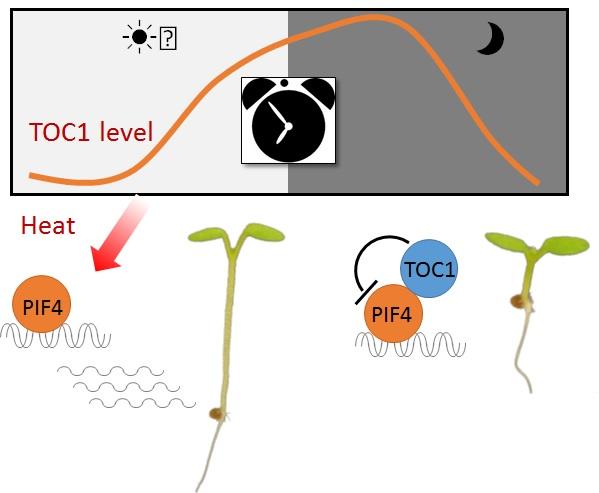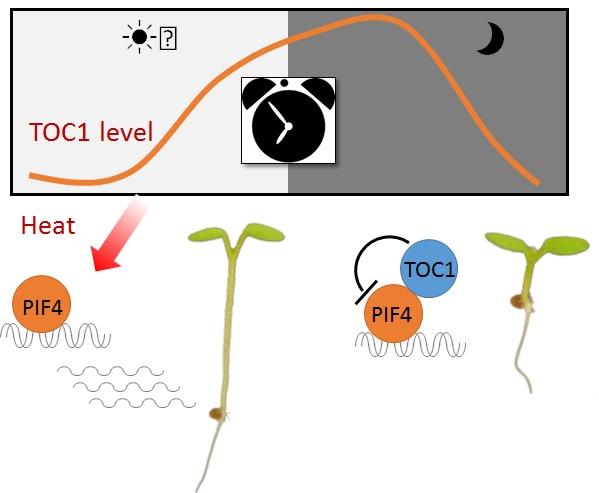
Credit: The illustration is provided courtesy of Eunkyoo Oh.
Stanford, CA–Climate change and recent heat waves have put agricultural crops at risk, which means that understanding how plants respond to elevated temperatures is crucial for protecting our environment and food supply.
For many plants, even a small increase in average temperature can profoundly affect their growth and development. In the often-studied mustard plant called Arabidopsis, elevated temperatures cause the plants to grow longer stems and thinner leaves in order to cope with the heat stress.
New work led by Carnegie's Zhiyong Wang uncovers the system by which plants regulate their response to heat differently between daytime and nighttime. It is published by Nature Communications.
One protein called Phytochrome Interacting Factor 4 (PIF4) is crucial to coordinating a plant's response to elevated temperature by activating the genes that help the plant deal with heat stress. But it only seems to be active during daylight hours. Wang and his team set out to find out what was constraining PIF4's activity to daytime.
They found that PIF4 is, in turn, regulated by another protein called Timing of CAB Expression 1 (TOC1), which is a part of the biological circadian clock proteins that accumulate at the end of the day. TOC1 binds to PIF4 and inhibits its activity in the evening and through the night. The disappearance of TOC1 at dawn allows PIF4 to respond to warm temperature in the morning.
Until now, how the circadian clock helps a plant's survival of heat stress was unknown.
"Since the hottest temperatures usually occur around noon and continue through the early afternoon, a plant's survival during a heat wave is most threatened during this period," Wang explained. "By tying the heat response to the circadian clock, plants maximize their chances of survival during heat waves."
"Zhiyong's new work reveals a potential energy-saving strategy in plants where heat-stress response genes are prevented from being turned on at night when there is less chance of heat stress. Using a circadian clock machinery to do this is quite elegant," says Sue Rhee, Director of Carnegie Plant Biology.
###
This work was supported by the U.S. National Institutes of Health, the National Research foundation of Korea and the Korean government.
The Carnegie Institution for Science is a private, nonprofit organization headquartered in Washington, D.C., with six research departments throughout the U.S. Since its founding in 1902, the Carnegie Institution has been a pioneering force in basic scientific research. Carnegie scientists are leaders in plant biology, developmental biology, astronomy, materials science, global ecology, and Earth and planetary science.
Media Contact
Zhiyong Wang
[email protected]
@carnegiescience
https://carnegiescience.edu/
############
Story Source: Materials provided by Scienmag





